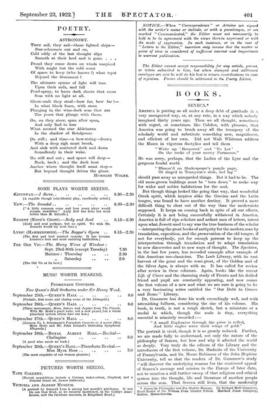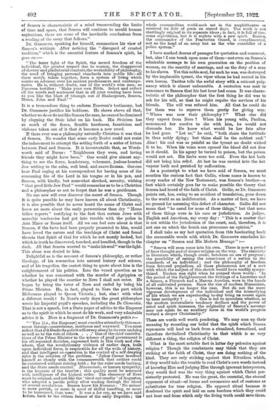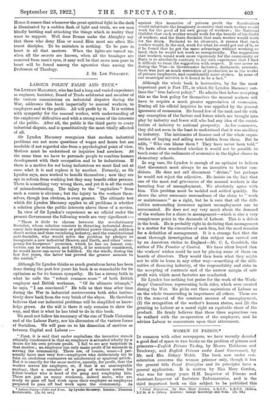BOOKS.
SENECA.*
AMERICA is putting us all under a deep debt of gratitude in very unexpected way, or, at any rate, in a way which nobody
imagined thirty years ago. Then we all thought, sometimes with regret, or sometimes, like Cobden, with pleasure, that America was going to brush away all the trumpery of the scholarly world and substitute something new, magnificent, and efficient of her own. Did not Walt Whitman address the Muses in vigorous dactylics and tell them "Write up 'Removed' and To Let' On the rocks of your snowy Parnassus."
He was sorry, perhaps, that the Ladies of the Lyre and the gorgeous feudal world " Blazon'd on Shakespeare's purple page, Or dirged in Tennyson's slow, sad lay" should pass away as unregarded things. But it had to be. The old moss-grown buildings must be "torn down" to make way for wider and nobler habitations for the soul.
But though things looked like going that way, that wonderful Greek spirit, which inspires alike the Grecian and the Latin tongue, was found to have another destiny. It proved a more difficult thing to clear out of the way than the modernists supposed. It keeps on coming back in spite of all our efforts.
Certainly it is not being successfully withstood in America. America is full of ripe scholars and ardent men of letters, intent upon what Jowett used to say was the true business of the scholar —interpreting the great books of antiquity for the modern man by translation, exposition, and the preservation of the old tongue, if not for everybody, yet for enough persons to keep up the interpretation through translation and to adapt translation to new discoveries and to new ways of thought. The Spectator, in the last few years, has recorded example after example of this American neo-classicism. The Loeb Library, with its vast harvest of the great and the semi-great, of the Golden and of the Silver Ages, is always with us. It has called for review _ after review in these columns. Again, books like the recent Life of Cicero and the charming study of Fronto and his deified friend and pupil are constantly appearing, and now COMM the first volume of a new and what we are sure is going to be a very fascinating series entitled the "Our Debt to Greece and Rome" Library.
Dr. Gummere has done his work exceedingly well, and with astonishing fullness, considering the size of his volume. His book, in truth, is not a rough sketch, but a miniature or a medal in which, though the scale is tiny, everything essential is minutely recorded : — "A small Euphrates through the piece is rolled, And little eagles wave their wings of gold."
The portrait is vivid, though it is so greatly reduced. Further, we are made fully to understand, not only the nature of the philosophy of Seneca, but how and why it affected the world so deeply. Very truly do the editors of the Library and the introducers of the first volume, Dr. Hadzsits of tho University of Pennsylvania, and Dr. Moore Robinson of the John Hopkins University, tell us that the readers of Dr. Gummere's study "will discover the underlying reasons for the continued appeal of Seneca's message and mission to the Europe of later date, not to mention a still further sweep of that religious and ethical system into the thought, life and literature of another people across the seas. That Seneca still lives, that the modernity
• Seneca the Philosopher and His Modern Message. By Richard Mott Gummy's, Head-Master of the William Penn Charter School. Marshall Jones Company, Boston. Massachusetts.
of Seneca -is characteristic of a mind transcending the limits of time and space, that Seneca will continue to mould human aspirations, these are some of the inevitable conclusions from a reading of the essay that follows."
Dr. Gummere, speaking for himself, summarizes his view of Seneca's writings. After noticing the "disregard of crusted tradition," which is the essential feature of Seneca's spirit, he goes on :— "The inner light of the Spirit, the sacred freedom of the individual, the greater respect due to women, the disapproval of slavery and gladiatorial combats,the workability of philosophy, the need of bringing personal standards into publie
these motifs, taken together, form a system of living which marks an advance over his ancient predecessors and contempo- raries. He is, without doubt, one of the world's wine men, as Emerson testifies : 'Make your own Bible. Select and collect all the words and sentences that in all your reading have been to you like the blast of triumph out of Shakespeare, Seneca, Moses, John and Paul.'"
It is a tremendous thing to endorse Emerson's testimony, but Dr. Gummere justifies his boldness. He shows above all that, whether we do or do not like Seneca the man, he cannot be dismissed by clapping the Stoic label on his back. His Stoicism has so much of the fierce, Semitic harshness, fanaticism and violence taken out of it that it becomes a new creed.
If there ever was a philosophy naturally Christian it was that of Seneca. No wonder that some early Zealot could not resist
the inducement to attempt the setting forth of a series of letters between Paul and Seneca. it is incontestable that, as Words-
worth said of Burns : "Neighbours they were, and loving friends they might have been." One would give almost any- thing to see the fierce, headstrong, vehement, jealous-hearted Jew writing to the calm, well bred, and suave Roman. One can hear Paul raging at his correspondent for having none of the consuming fire of the Lord in his tongue or in his pen, and Seneca, with kindly, but somewhat shocked, serenity, wishing "that good little Jew Paul" would remember so to be a Christian and a philosopher as not to forget that he was a gentleman. No one now will ever discover the secret of Seneca. Though it is quite possible he may have known all about Christianity, it is also possible that he never heard the name of Christ and knew no more about the early persecutions than dry "Home Office reports" testifying to the fact that certain Jews with anarchic tendencies had got into trouble with the police in Asia Minor or Rome itself. All we can feel sure about is that Seneca, if the facts had been properly presented to him, would have loved the nature and the teaching of Christ and found therein that Spirit of God for which he not merely looked, but which in truth he discovered, touched, and handled, though in the dark. All that Seneca wanted to "make his soul" waathe light.
This alone was denied to him.
Delightful as is the account of Seneca's philosophy, or rather theology, of his researches into natural history and science, and of his tragedies, the easiest thing to quote about him is the enlightenment of his politics. Into the vexed question as to 'whether he was concerned with the murder of Agrippina or whether he played the courtier to Nero I shall not enter. He began by being the tutor of Nero and ended by being his Prime Minister. He, in fact, played to Nero the part which Melbourne played to Queen Victoria ; but, alas ! with what a. different result I In Nero's early days the great philosopher
wrote his Imperial pupil's speeches, including the De Clementia. That is not a speech, but a State paper of advice to the Emperor aa to the spirit in which he must do his work, and very admirable advice it is. Here is a fragment of Dr. Gummere's precis " ' You [i.e., the Emperor] must consider attentively this enor- mous throng—quarrelsome mutinous and wayward. You must reflect that if it breaks do yoke it will sweep along to its own undoing as well as to the ruin of others. . . One of the chief contribu. tions of the Prime Minister to the science of good government is his oft-repeated doctrine, expressed both in this work and else- where, that the revolutionary violence of earlier days, built upon individual force, is responsible for all the evils of history, and that intelligent co-operation in the control of a self-denying ruler is the solution of the problem. Julius Caesar involved himself so closely with the commonwealth that neither could be extricated without ruining both ; for the ruler needs backing, and the State needs control.' Mansuetudo, or human sympathy, is the keynote of the treatise ; this quality must be seasoned with intelligence of the highest order. The clemency of Nero must be original, and not like the 'tired-out cruelty' of Augustus, who adopted a pacific policy after wading through the blood of several revolutions. Seneca knew his Romans : 'No animal is more pettish, or more in need of skilful handling, or more to be humoured, than man.' It was a far cry, as we have said before, back to the citizen farmer of the early Republic; the
whole cosmopolitan world-mob sat in the amphitheatre or received its dole of grain on stated days. The work is not startlingly original in its separate ideas ; in fact, it is full of tire. some repetitions, but it is replete with a new spirit. Burrus, the commander of the Praetorian Guard, is complimented, not as the head of an army but as the wise controller of a police system."
I have marked dozens of passages for quotation and comment, but, alas ! I Inn touch upon none of them—not even on Seneca's admirable message to his own generation on the position of women, on the sanctity of marriage, and on the duty of a man to his slaves. Yet this noble soul, for such he was, was destroyed by the implacable tyrant, the viper whom he had nursed in his own bosom. Tacitus tells the awful story with a reticent poig- nancy which is almost unbearable. A centurion was sent to announce to Seneca that his last hour had come. It was charac- teristic of the philosopher that the first thing he did was to ask for his will, so that he might requite the services of his friends. The will was refused him. All that he could do for them was to reprove them gently for giving way. "Where was now their philosophy ? " What else did they expect from Nero ? When his young wife, Pauline, announced her resolve to die with him, he would not dissuade her. He knew what would be her fate after he had gone. "Let us," he said, "both share the fortitude In thus nobly dying ; but thine shall be the noblest end." Alas! his end was as painful as the tyrant no doubt wished it to be. When his veins were opened the blood did not flow as it should. In his agony he turned to poison, but the poison would not act. His limbs were too cold. Even the hot bath did not bring him relief. At last he was carried into the hot vapour bath and perished by suffocation.
As a postscript to what we have said of Seneca, we must mention the curious fact that Gallio, whose name is known to every reader of the New Testament, was Seneca's brother—a fact which certainly goes far to make possible the theory that Seneca had heard of the faith of Christ. Gallio, as Dr. Gummere points out, has, owing to an accident of translation, gone down to the world as an indifferentist. As a matter of fact, we have no ground for assuming this defect of character. Gallio did not mean that "he eared for none of these things," but that none of these things were in his care or jurisdiction. As judges, Thiglish and American, say every day : "This is a matter that is not within the jurisdiction of the court, and, therefore, it is not one on which the bench can pronounce an opinion."
X shall take as my last quotation from this fascinating book the memorable words with which Dr. Gummere concludes his chapter on "Seneca and His Modem Message" :— "Seneca will soon come into his own. There is now a period of freer thought and of deeper religion on the way. The elasticity in literature which, though crude, betokens an era of progress ; the possibility of raising the conscience of a nation to the standards of an individual ; and the philosophy of freedom from fettered prejudices, all these phenomena are of a sort with which the subject of this sketch would have readily sympa- thized. Eucken was right when he penned these words : hi the period of the Rnlightenment the writings of a Lucretius and a Seneca, a Plutarch and a Marcus Aurelius, were in the hands of all cultivated persons. Since the rise of modern Humanism, however, this is no longer the case. But do not the more vigorous development of the individual and the intensifying of life which we are experiencing to-day bring us nearer again to later antiquity ? . . . One is led to speculate whether, as the modem materialistic tendency declines and the power of mind and spirit increases, the originality of Seneca's message may not again be an auxiliary force in the world's progress toward a deeper Christianity."
These are words well worth pondering. We may sum up their meaning by recording our belief that the spirit which Seneca represents will lead us back from a ritualized, formalized, and therefore devitalized Christianity to that which is so very different a. thing, the religion of Christ.
What is the most notable fact in latter day polemics against religion ? Though the combatants may think that they are striking at the faith of Christ, they are doing nothing of the kind. They are only striking against that Ritualism which, if they would take the trouble to read Christ's own words instead of knowing Him and judging Irani through ignorant interpreters, they would find was the very thing against which Christ per- sistently protested. He was the great, the essential, the eternal opponent of ritual—of forms and ceremonies and of customs as substitutes for true religion. He opposed ritual because it deadened the spirit and laid on men burdens which they could not bear and from which only the living truth could save them. Hence it comes that whenever the great spiritual fight in the dark is illuminated by a sudden flash of light and truth, we see men blindly battling and attacking the things which in reality they want to support. Well does Renan make the Almighty say that those who deny Him or assail Him most are often His truest disciples. To be mistaken is nothing. To be pure in heart is all that matters. When the lights are turned up, when all the secrets are known, when all the bandages are removed from men's eyes, it may well be that more men pure in heart will be found among the agnostics than among the Professors of Theology.
J. Sr. Lo E STRACHEY.




































 Previous page
Previous page